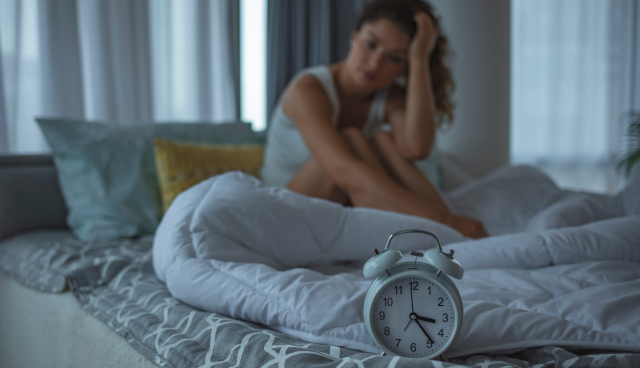
Battling Insomnia: Tips for Getting the Sleep You Need
Insomnia is a prevalent sleep disorder that affects millions of people worldwide, making it difficult for them to get the restful sleep they need. While occasional trouble sleeping is normal, chronic insomnia can have a profound impact on one’s physical and mental health. In this blog, we will explore the causes of insomnia, various insomnia treatments, and effective insomnia therapies to help you overcome this sleepless struggle. By understanding the reasons for insomnia and implementing the right strategies, you can regain control of your sleep and improve your overall well-being.
What is Insomnia?
Insomnia is a sleep disorder characterized by difficulty falling asleep, staying asleep, or experiencing restorative sleep. It can manifest as trouble sleeping for a few nights or become a long-term issue known as chronic insomnia. Chronic insomnia is defined as persistent sleep disturbances that occur at least three nights a week for three months or longer. Understanding the causes of insomnia is the first step towards finding effective insomnia treatment and therapies.
Causes of Insomnia
- Stress and Anxiety: High levels of stress and anxiety can lead to racing thoughts and make it challenging to relax and fall asleep. This is among the most typical causes of sleeplessness.
- Poor Sleep Hygiene: Irregular sleep schedules, excessive use of electronic devices before bedtime, and poor sleep habits can disrupt your body’s natural sleep-wake cycle.
- Medical Conditions: Certain medical conditions, such as chronic pain, asthma, allergies, and gastrointestinal problems, can contribute to insomnia.
- Medications: Some medications, including those for asthma, allergies, colds, and high blood pressure, can interfere with sleep.
- Mental Health Disorders: Conditions like depression and bipolar disorder are linked to insomnia, often resulting in difficulty falling and staying asleep.
- Substance Abuse: The use of stimulants like caffeine, nicotine, and alcohol can disrupt sleep patterns and lead to insomnia.
- Shift Work: People working irregular hours or night shifts are at higher risk of developing insomnia due to the disruption of their natural circadian rhythms.
- Age: As we age, our sleep patterns change, and insomnia becomes more common in older adults.
Insomnia Treatment
While chronic insomnia can be a challenging condition to manage, there are various approaches to insomnia treatment that can help individuals improve their sleep quality and duration. To ascertain the best course of action, it is imperative to speak with a healthcare provider. Here are some common treatment options:
- Cognitive-Behavioral Therapy (CBT): CBT is a widely used and effective approach for treating insomnia. It helps individuals identify and modify behaviors and thought patterns that contribute to sleep problems.
- Medication: In some cases, healthcare providers may prescribe sleep medications to help individuals with chronic insomnia. These should be used under medical supervision due to the potential for dependency and side effects.
- Lifestyle Changes: Adopting a healthy lifestyle can significantly impact your sleep. This includes maintaining a regular sleep schedule, reducing caffeine and alcohol intake, and exercising regularly.
- Relaxation Techniques: Practicing relaxation techniques like deep breathing, meditation, or progressive muscle relaxation can help ease stress and anxiety, improving sleep quality.
- Sleep Restriction: This approach involves limiting the time spent in bed to the actual time you sleep. It can eventually assist in controlling your sleep cycles.
Insomnia Therapies
In addition to the conventional treatment options mentioned above, there are alternative therapies and practices that can complement your efforts in battling insomnia. These insomnia therapies are often natural and non-invasive, offering a holistic approach to improving sleep quality.
- Acupuncture: Acupuncture involves the insertion of fine needles into specific points on the body to promote relaxation and restore balance. Some individuals find relief from insomnia through acupuncture.
- Herbal Remedies: Certain herbs, such as valerian root and chamomile, are believed to have sleep-inducing properties. But before utilising any natural therapies, speak with a medical expert.
- Aromatherapy: Using essential oils like lavender, cedarwood, or bergamot in a diffuser or as part of a bedtime routine can create a calming atmosphere conducive to sleep.
- Yoga and Tai Chi: These mind-body practices emphasize relaxation, deep breathing, and mindfulness. Regular participation can reduce stress and improve sleep quality.

- Biofeedback: Biofeedback involves learning how to control physiological functions like heart rate and muscle tension. It can facilitate better sleep and stress management.
Lifestyle Changes for Better Sleep
Besides formal treatment and complementary therapies, making lifestyle changes can significantly impact your ability to overcome insomnia. Here are some practical tips to help you get the sleep you need:
- Create a Comfortable Sleep Environment: Ensure your bedroom is conducive to sleep by keeping it dark, quiet, and at a comfortable temperature. A comfortable mattress and pillows are also crucial for restful sleep.
- Establish a Consistent Sleep Schedule: Go to bed and wake up at the same time every day, even on weekends. Your body’s internal clock may be regulated with consistency.
- Limit Exposure to Screens: The blue light emitted by electronic devices can interfere with your circadian rhythms. At least one hour before going to bed, avoid using screens.
- Monitor Your Diet: Steer clear of large or spicy foods right before bed. Also, limit your caffeine and alcohol intake, especially in the evening.
- Exercise Regularly: Engage in regular physical activity, but avoid intense workouts close to bedtime, as they can be stimulating.
- Manage Stress: Practice stress-reduction techniques like mindfulness, meditation, or progressive muscle relaxation to calm your mind before sleep.
- Limit Naps: While short naps can be refreshing, avoid long daytime naps, as they can disrupt your nighttime sleep.
Conclusion:
Insomnia can be a challenging condition to live with, but it’s not insurmountable. By understanding the causes of insomnia and exploring various insomnia treatments and insomnia therapies, you can take the necessary steps to overcome it. Whether you opt for conventional treatment, alternative therapies, or lifestyle changes, the goal is the same: to regain control of your sleep and improve your overall well-being.
Remember, the road to better sleep may require patience and perseverance, as what works for one person may not work for another. Speak with a healthcare expert to develop a customised plan that meets your unique requirements. With dedication and the right strategies, you can conquer insomnia and enjoy the peaceful, restorative sleep you deserve.
